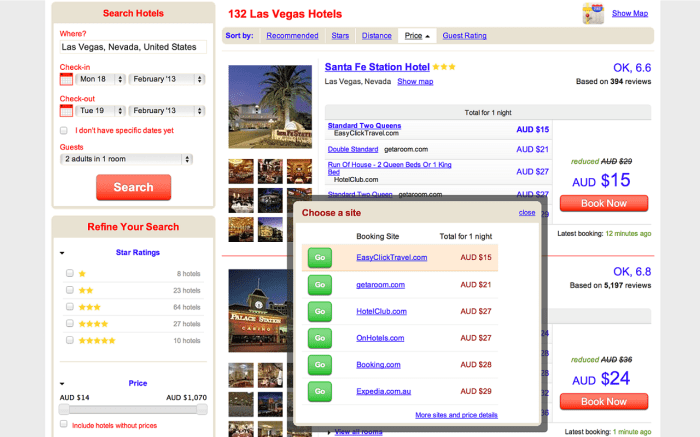Hotel Booking Offers Your Guide to Savings

Hotel booking offers: Unlocking amazing deals on your next getaway is easier than you think! This guide dives into the world of hotel discounts, exploring various offer types, the platforms offering them, and the factors influencing their availability. We’ll also cover essential terms and conditions to ensure a smooth booking process and help you make informed decisions about your travel plans.
From understanding the nuances of different offer categories – like flash sales, loyalty programs, and package deals – to navigating various online booking platforms, we’ll equip you with the knowledge to snag the best hotel deals. We’ll analyze how factors like seasonality and occupancy rates impact pricing, and discuss the potential benefits and drawbacks of using these offers. Get ready to become a savvy hotel booker!
Types of Hotel Booking Offers
Finding the perfect hotel at the perfect price can feel like a treasure hunt. Luckily, there are many different types of hotel booking offers designed to help you snag a great deal. Understanding these offers and their nuances will empower you to make informed choices and maximize your savings.
Five Categories of Hotel Booking Offers
Hotel booking offers come in various forms, each catering to a specific traveler profile and budget. Let’s explore five distinct categories:
| Offer Type | Description | Advantages | Disadvantages |
|---|---|---|---|
| Early Bird Discounts | Booking your hotel well in advance often unlocks significant discounts. These offers incentivize early planning and secure your reservation early. | Significant cost savings, and peace of mind knowing your accommodation is secured. | Less flexibility if plans change; may miss out on potentially better deals closer to the travel date. |
| Last-Minute Deals | Hotels often reduce prices for rooms that haven’t been booked closer to the check-in date to fill their vacancies. | Potentially very low prices, spontaneous travel opportunities. | Limited availability, less time to plan, possibly less desirable room choices. |
| Package Deals | These bundles combine hotel stays with other services like flights, car rentals, or activities, often at a reduced overall price. | Convenience, cost savings compared to booking separately, simplified travel planning. | Less flexibility in choosing individual components; may include services you don’t need. |
| Loyalty Program Discounts | Hotels often reward repeat customers with exclusive discounts, upgrades, or other perks. | Consistent savings, potential for upgrades and special amenities, personalized service. | Requires repeat bookings with the same hotel chain, and may not offer the best overall price compared to other deals. |
| Seasonal Offers | Hotels adjust pricing based on the season, offering lower rates during the off-season and higher rates during the peak season. | Significant cost savings during off-peak periods; an opportunity to experience a destination with fewer crowds. | Limited availability during peak season; may require travel during less desirable weather conditions. |
Target Audience for Each Offer Type
Each offer type attracts a different type of traveler. Early bird discounts appeal to planners who value security and savings. Last-minute deals attract spontaneous travelers seeking bargains. Package deals suit those who prioritize convenience and bundled savings. Loyalty program discounts reward frequent travelers who prefer consistent value and perks. Seasonal offers cater to budget-conscious travelers willing to adjust their travel dates.
Platforms Offering Hotel Booking Offers

Source: ramadalucknow.com
Finding the perfect hotel at the perfect price often hinges on knowing where to look. Many online platforms specialize in connecting travelers with hotels and offering various deals and discounts. Understanding the nuances of each platform can significantly impact your travel budget and overall experience.
Numerous online travel agencies (OTAs) and direct booking sites offer a wide range of hotel booking offers. These offers vary considerably depending on the platform, the hotel, the time of year, and even the specific day you book. Some platforms specialize in budget travel, while others focus on luxury accommodations. Understanding these differences is crucial for securing the best possible deal.
Online Platforms and Their Hotel Booking Offers
Below is a list of ten online platforms known for offering hotel booking deals. The variety in their offers reflects the competitive nature of the online travel industry.
- Booking.com: Known for its extensive selection and range of price points, from budget-friendly hostels to luxury resorts. Offers often include discounts, free cancellations, and reward programs.
- Expedia: Similar to Booking.com, Expedia offers a vast inventory and various deals, often bundling flights and hotels for package discounts.
- Hotels.com: Famous for its “Rewards” program, where you earn a free night after ten stays. Offers vary but often include discounts and special promotions.
- Agoda: Strong presence in Asia, Agoda provides competitive pricing and offers tailored to the region, often including local deals and experiences.
- Kayak: Primarily a metasearch engine, Kayak compares prices from multiple sources, allowing you to find the best deal across various platforms.
- Priceline: Known for its “Name Your Price” feature, Priceline allows users to bid on hotel rooms, potentially securing significant savings.
- Hotwire: Similar to Priceline, Hotwire offers discounted “Hot Rate” deals where the hotel name is revealed only after booking.
- Orbitz: Orbitz offers a wide selection of hotels, often with package deals that include flights and rental cars.
- Google Hotels: Google’s hotel search integrates with many booking platforms, providing a comprehensive overview of prices and availability.
- TripAdvisor: While primarily a review site, TripAdvisor also allows users to book hotels directly, often highlighting deals and promotions.
Comparative Analysis of User Interfaces and Booking Processes
Comparing the user interfaces and booking processes across different platforms is essential for efficient and enjoyable travel planning. We’ll examine three platforms: Booking.com, Expedia, and Hotels.com.
Booking.com generally boasts a clean and intuitive interface. The search and filtering options are comprehensive, allowing users to easily refine their search based on various criteria. The booking process is straightforward and laid out. Expedia’s interface is similar, offering a wide range of filters and options. However, it can sometimes feel a bit cluttered due to its extensive features. Hotels.com stands out with its straightforward design and emphasis on its rewards program. The booking process is user-friendly, but the interface might feel less feature-rich than Booking.com or Expedia.
Platform Comparison Table
This table summarizes the key features and user experience of the selected platforms.
| Platform Name | URL | Notable Offers | User Experience (1-5) |
|---|---|---|---|
| Booking.com | www.booking.com | Wide selection, discounts, free cancellations, rewards program | 4 |
| Expedia | www.expedia.com | Package deals (flights + hotels), various discounts, bundled services | 3 |
| Hotels.com | www.hotels.com | Rewards program (free night after 10 stays), discounts, promotions | 4 |
Factors Influencing Hotel Booking Offers

Source: freebies2deals.com
Hotel booking offers, those tempting deals that lure us into spontaneous getaways or meticulously planned vacations, aren’t conjured out of thin air. Their availability and pricing are influenced by a complex interplay of factors, all working together to determine what deals we see and when. Understanding these factors gives both travelers and hoteliers a clearer picture of the booking landscape.
Key Factors Influencing Hotel Booking Offers and Pricing
Several key elements significantly impact the availability and pricing of hotel booking offers. These factors often interact, creating a dynamic and ever-shifting market.
- Seasonality: Demand fluctuates dramatically throughout the year. Peak seasons command higher prices, while off-seasons see more competitive offers.
- Hotel Occupancy Rates: Hotels are more likely to offer discounts when occupancy is low to fill rooms and maximize revenue. High occupancy often leads to fewer deals.
- Competition: The presence of nearby hotels and their pricing strategies heavily influence a hotel’s offers. Hotels constantly adjust their pricing to remain competitive.
- Lead Time: Bookings made far in advance often receive better rates than last-minute bookings, as hotels can better plan their resources.
- Promotional Campaigns and Events: Special events, holidays, or marketing campaigns can lead to both increased prices and targeted offers, depending on the hotel’s strategy.
Seasonal Changes and Their Impact on Hotel Offers, Hotel Booking Offers
Seasonal changes directly impact the types of offers available. During peak seasons (summer holidays, major events), hotels often charge premium prices due to high demand. Conversely, during the off-season (winter months, shoulder seasons), hotels are more likely to offer discounts, packages, and promotions to attract guests. For example, a beach resort might offer significantly reduced rates during the colder months, while a ski resort might offer attractive packages during peak snow seasons. This seasonal fluctuation allows hotels to optimize their revenue throughout the year.
Hotel Occupancy Rates and Offer Availability
Hotel occupancy rates are a crucial factor in determining the availability of offers. When occupancy is low, hotels are incentivized to offer discounts and promotions to fill empty rooms. Conversely, when occupancy is high, there’s less need for aggressive discounting. For example, a hotel with a 70% occupancy rate might be less inclined to offer significant discounts compared to a hotel with a 30% occupancy rate. This strategy is a core element of revenue management for hotels.
Hotel Decision-Making Process for Creating Booking Offers
The following flowchart illustrates a simplified decision-making process a hotel might use when creating booking offers:
[Flowchart Description]
Imagine a flowchart with a starting point labeled “Assess Current Occupancy Rate.” This leads to two branches: “High Occupancy (above 80%)” and “Low Occupancy (below 80%).” The “High Occupancy” branch leads to “Maintain current pricing/limited offers,” while the “Low Occupancy” branch leads to a decision point “Is it peak season?”. This leads to two more branches: “Yes (peak season)” and “No (off-season)”. The “Yes” branch leads to “Offer limited discounts/packages,” and the “No” branch leads to “Implement significant discounts/promotions.” All branches eventually converge to “Implement and monitor offer performance.” This flowchart shows a simplified version of the process; the actual process would involve many more factors and nuances.
Terms and Conditions of Hotel Booking Offers

Source: bigstockphoto.com
Snagging a great hotel deal is exciting, but it’s crucial to understand the fine print before you click “book.” Terms and conditions are legally binding agreements, so knowing what they cover protects you from unexpected costs and disappointments. Let’s delve into some key aspects.
Common Terms and Conditions
Three common terms and conditions frequently found in hotel booking offers include cancellation policies, payment terms, and the hotel’s liability limitations. Cancellation policies Artikel the timeframe within which you can cancel your reservation without penalty. Payment terms specify when and how payment is due, often requiring full payment upfront or a deposit to secure the booking. Liability limitations define the hotel’s responsibility for lost or damaged property or other unforeseen circumstances. For example, a cancellation policy might state that cancellations made more than 7 days before arrival are fully refundable, while those made within 7 days incur a 50% penalty. Payment terms could stipulate full payment 24 hours after booking, while liability might be limited to a certain monetary amount per incident.
Implications of Cancellation Policies on Various Offer Types
Cancellation policies significantly impact the flexibility and risk associated with different types of hotel booking offers. Non-refundable offers, often the cheapest, typically have strict cancellation policies, meaning you lose your entire payment if you cancel. Flexible offers, usually more expensive, allow for cancellations with minimal or no penalty up to a certain point before your arrival. Last-minute deals often have very restrictive cancellation policies because the hotel is trying to fill a room quickly. Consider a scenario where a traveler books a non-refundable offer for $100. If they cancel, they lose the entire $100. However, if they booked a flexible offer for $120 and cancel within the allowed timeframe, they may only lose a small cancellation fee, or get a full refund.
Potential Hidden Costs or Fees
Hidden costs can significantly inflate the initial price of a hotel booking. These often include resort fees (covering amenities like pools or Wi-Fi), parking fees, early check-in/late check-out fees, and tourist taxes. For instance, a hotel might advertise a room for $80 per night, but upon booking, a $30 resort fee and $20 parking fee per day are added, bringing the actual cost to $130 per night. Similarly, requesting an early check-in or late check-out could incur additional fees depending on the hotel’s policy and availability. Always carefully review the final booking confirmation to ensure all charges are clear and transparent.
Essential Aspects to Check Before Accepting a Hotel Booking Offer
Before confirming your hotel booking, it’s essential to check several key details.
- The total price, including all taxes and fees.
- The cancellation policy and any associated penalties.
- The hotel’s location and proximity to your desired attractions.
- Guest reviews and ratings to gauge the hotel’s quality and service.
- The hotel’s amenities and facilities (Wi-Fi, parking, pool, etc.).
- The payment methods accepted and any required deposits.
- The check-in and check-out times.
Impact of Hotel Booking Offers on Consumers
Hotel booking offers significantly influence consumer behavior and travel planning, impacting both the decision-making process and the overall travel experience. Understanding this influence is crucial for both travelers and the hospitality industry. These offers, ranging from discounts to bundled packages, can dramatically alter how and where people choose to travel.
Consumer Behavior and Travel Planning Decisions
Hotel booking offers directly impact consumer behavior by altering their perceived value. Discounts and promotions incentivize bookings that might not otherwise occur, leading to increased travel frequency or the selection of more expensive accommodations. The ease of comparison shopping facilitated by online travel agencies (OTAs) and hotel websites further amplifies this effect. Travelers often meticulously compare prices and offers before making a decision, leading to a more price-sensitive approach to travel planning. The availability of offers can also influence the timing of travel, with consumers more likely to book during promotional periods.
Benefits and Drawbacks of Utilizing Hotel Booking Offers
Utilizing hotel booking offers presents both advantages and disadvantages. The primary benefit is, of course, cost savings. Consumers can secure significant discounts, potentially saving hundreds or even thousands of dollars depending on the length of stay and the type of accommodation. Offers can also unlock access to amenities or experiences that might otherwise be unaffordable, such as free breakfast, spa treatments, or airport transfers. However, drawbacks exist. Offers may come with restrictions, such as limited availability, specific travel dates, or non-refundable bookings. Consumers should carefully examine the terms and conditions before booking to avoid unexpected fees or limitations. Furthermore, the focus on price may lead to overlooking other crucial factors like location, hotel quality, or customer reviews.
Comparative Analysis of Booking With and Without Offers
| Booking With Offers | Booking Without Offers |
|---|---|
| Potentially lower cost | Higher initial cost |
| May include additional amenities or services | Amenities may need to be purchased separately |
| Limited availability and potential restrictions | Greater flexibility in travel dates and options |
| Requires careful examination of terms and conditions | The simpler booking process with fewer restrictions |
| Example: Booking a 5-night stay in a resort for $500 instead of $750 with a promotional code. | Example: Booking the same resort for $750 without any discount, but enjoying greater flexibility in changing dates if needed. |
Visual Representation of Hotel Booking Offers
Effective visual communication is crucial for attracting customers and converting them into bookings. The design elements used – colors, fonts, imagery – significantly impact how appealing and trustworthy an offer appears. Let’s explore how different types of hotel booking offers can be visually represented to maximize their impact.
Flash Sale Visual Representation
A flash sale banner for a hotel booking would utilize a high-contrast color scheme to immediately grab attention. Imagine a vibrant, almost electric orange or red background, contrasting sharply with a crisp white or bright yellow font for the text. The font itself would be bold and sans-serif, conveying a sense of urgency and modernity. The headline might read something like “FLASH SALE! 50% OFF!” in a large, easily readable size. Supporting text, detailing the limited-time nature of the offer and the specific dates would be smaller but still easily visible. A background image showcasing a luxurious hotel room or a stunning vacation destination would subtly reinforce the value proposition. A countdown timer prominently displayed would further amplify the sense of urgency, prompting immediate action.
Loyalty Program Visual Representation
Visuals for a loyalty program should project exclusivity and reward. Consider a sophisticated color palette, perhaps using deep blues, rich purples, or elegant golds. The imagery might feature well-dressed individuals enjoying luxurious amenities at the hotel, emphasizing the premium experience offered to members. The font would be refined and elegant, possibly a serif font that suggests tradition and quality. The offer itself could be presented within a subtly textured background, hinting at exclusivity. Visual cues like a crown or star icon subtly incorporated into the design could further communicate the special status associated with the loyalty program. The text might highlight member-exclusive benefits like complimentary upgrades or early check-in/late check-out.
Package Deal Visual Representation
A package deal offer should clearly and concisely communicate the bundled services included. A clean, organized layout is key. Imagine a visually appealing collage showcasing the various elements of the package – a picture of the hotel, images representing the included activities (e.g., a spa treatment, a romantic dinner, a guided tour), and perhaps a map highlighting the location. Each element would be clearly labeled and visually distinct. A color-coded system might be used to categorize the different components of the package for easy understanding. The overall design should be bright, and inviting, and clearly show the overall value proposition of the package compared to booking individual services. For example, a comparison table showcasing the individual costs versus the total package cost could be included to highlight the savings. The text would focus on the benefits of the package and use persuasive language to encourage bookings.
Ultimate Conclusion

Source: ggpht.com
Securing the perfect hotel at the perfect price is within your reach! By understanding the different types of hotel booking offers, the platforms that provide them, and the factors influencing their availability, you can confidently navigate the world of travel deals. Remember to always read the fine print, compare options, and consider your individual needs to find the best offer for your next adventure. Happy travels!
FAQs: Hotel Booking Offers
What’s the best time to book hotel offers?
Generally, booking well in advance or during off-season periods often yields better deals. However, last-minute flash sales can also offer significant savings.
Are hotel booking offers always cheaper?
Not necessarily. While many offers provide discounts, it’s crucial to compare prices with and without offers to ensure you’re getting a true bargain. Hidden fees can sometimes negate the apparent savings.
Can I cancel a hotel booking with an offer?
Cancellation policies vary widely depending on the offer and hotel. Always check the terms and conditions before booking to understand the implications of cancellation.
What are some common hidden costs in hotel bookings?
Resort fees, parking fees, and extra charges for amenities are common hidden costs. Carefully review the total price before confirming your booking.
How can I find the best hotel booking offers?
Use price comparison websites, sign up for email alerts from various booking platforms, and consider using loyalty programs for potential discounts.
Comments are closed.